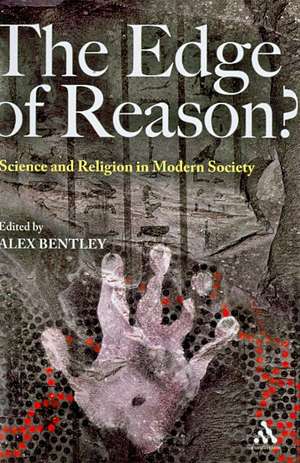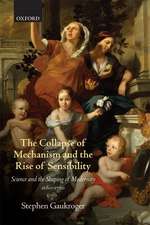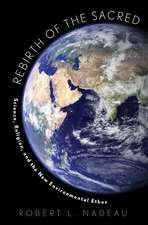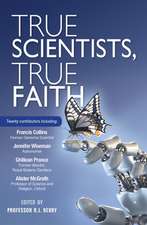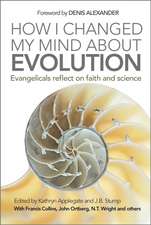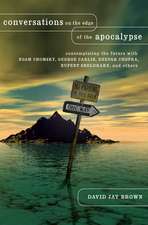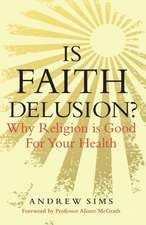The Edge of Reason?: Science and Religion in Modern Society
Editat de Dr Alex Bentleyen Limba Engleză Paperback – 21 sep 2008
| Toate formatele și edițiile | Preț | Express |
|---|---|---|
| Paperback (1) | 213.71 lei 3-5 săpt. | |
| Bloomsbury Publishing – 21 sep 2008 | 213.71 lei 3-5 săpt. | |
| Hardback (1) | 861.92 lei 6-8 săpt. | |
| Bloomsbury Publishing – 21 sep 2008 | 861.92 lei 6-8 săpt. |
Preț: 213.71 lei
Preț vechi: 355.95 lei
-40% Nou
Puncte Express: 321
Preț estimativ în valută:
40.90€ • 42.54$ • 33.76£
40.90€ • 42.54$ • 33.76£
Carte disponibilă
Livrare economică 24 martie-07 aprilie
Preluare comenzi: 021 569.72.76
Specificații
ISBN-13: 9781847062185
ISBN-10: 1847062180
Pagini: 248
Ilustrații: 10
Dimensiuni: 129 x 198 x 23 mm
Greutate: 0.3 kg
Editura: Bloomsbury Publishing
Colecția Continuum
Locul publicării:London, United Kingdom
ISBN-10: 1847062180
Pagini: 248
Ilustrații: 10
Dimensiuni: 129 x 198 x 23 mm
Greutate: 0.3 kg
Editura: Bloomsbury Publishing
Colecția Continuum
Locul publicării:London, United Kingdom
Caracteristici
Science and religion is a significant contemporary debate, this book tackles the subject from a new important angle.
Cuprins
Forward: Mary Midgley Introduction Alex Bentley, Durham UniversityShould scientists challenge religious beliefs in modern society? 1 Science and religion: negotiating the 21st century rapids.Denis Alexander, Cambridge University 2 Why new atheist definitions of religion fail. Mark Hulsether, University of Tennessee 3 Aboriginal versus Western creationism. Bob Layton, Durham University4 Science versus anthropology, not religion.Simon Coleman, Sussex University5 Atheism and liberty. Michael Shermer, Sceptics Society & Scientific American Is religion inevitable? Prehistory and evolution6 The evolution of warfare. Herbert Maschner and Katherine Reedy-Maschner, Idaho State University 7Why we are good: Mirror neurons and the roots of empathy. Gordy Slack, US Author 8The evolution of religion. Lewis Wolpert, University College London9Is religion inevitable? An archaeologist's view from the past. Steven Mithen, University of Reading10 Artificials, or why Darwin was wrong about humans. Timothy Taylor, University of BradfordIs religion harmful? From brains to societies11 Brain science and belief. Andrew Newberg, University of Pennsylvania 12 Why Richard Dawkins is wrong about religion. David Sloan Wilson, Binghamton University13Public terror vs. public good: Views from Japan and England. Ian Reader, University of Manchester14Buddhism: A better balance in the East? Hiroko Kawanami, Lancaster UniversityCan science itself inspire spiritual wonder? Broader views15Can scientific discovery be a spiritual experience? John Hedley Brooke, Oxford University16Heavens above! Old notions never die, they just incorporate.William Calvin, University of Washington17Other intelligences. Seth Shostak, SETI Institute Senior Astronomer18Natural theology in contemporary cosmology. David Wilkinson, Durham UniversityEpilogue: Science and Religion, not Science or Religion. Michael J. O'Brien, University of Missouri
Recenzii
"A stimulating series of brief forays into the science-theology-atheism border lands which will send the reader off to follow up leads here and there. Highlights are the discussions of evolution in terms that go beyond the individual gene or creature (and the observation that these inter preta tions were frowned upon by Thatcherites), and of the part played by "mirror neurons" in the fledgling evolution ary history of selfhood." - Church Times
Overall, this is an imaginative volume with plenty of food for thought... this book is an informative, engaging and very enjoyable read.
"Systems of logic and belief never split into neat oppositions between science and religion, but are mediated by cultural, philosophical, and contextual forces that shape these systems - all of them - as reasonable and natural. It is the making and mobilisation of the givens of human knowledge, rather than its perfection to grasp a preordained cosmology, that must be understood if we are to break free of the impasse that has come to prevail between Creationists and Evolutionists, as revealed in this fascinating dialogue between leading anthropologists, archaeologists, philosophers, theologians, biologists and physicists. Inter-disciplinarity at its best!" Professor Ash Amin, Director of the Institute of Advanced Study, Durham University, UK
Title reviewed inPublishing News, 2008.
Mention -Book News, February 2009
"It will challenge not only ideological atheists but also religious theists ... the contributors have minimized jargon and each essay has been written with the interested layperson in mind." - Reform
Title mention in Church Times.
"A bundle of interesting insights by scholars who contribute not only academic but personal experience to the discussion." - ESSAT-News (European Society for the Study of Science and Theology)
Overall, this is an imaginative volume with plenty of food for thought... this book is an informative, engaging and very enjoyable read.
"Systems of logic and belief never split into neat oppositions between science and religion, but are mediated by cultural, philosophical, and contextual forces that shape these systems - all of them - as reasonable and natural. It is the making and mobilisation of the givens of human knowledge, rather than its perfection to grasp a preordained cosmology, that must be understood if we are to break free of the impasse that has come to prevail between Creationists and Evolutionists, as revealed in this fascinating dialogue between leading anthropologists, archaeologists, philosophers, theologians, biologists and physicists. Inter-disciplinarity at its best!" Professor Ash Amin, Director of the Institute of Advanced Study, Durham University, UK
Title reviewed inPublishing News, 2008.
Mention -Book News, February 2009
"It will challenge not only ideological atheists but also religious theists ... the contributors have minimized jargon and each essay has been written with the interested layperson in mind." - Reform
Title mention in Church Times.
"A bundle of interesting insights by scholars who contribute not only academic but personal experience to the discussion." - ESSAT-News (European Society for the Study of Science and Theology)
